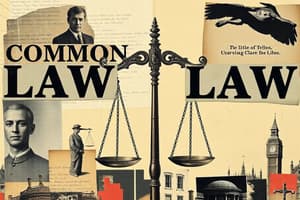Podcast
Questions and Answers
What role do judges play in common law systems?
What role do judges play in common law systems?
- Investigators seeking to establish facts
- Advisors to lawyers on case strategies
- Codifiers of legal statutes
- Referees arbritrating between opposing sides (correct)
Which statement accurately describes the role of lawyers in civil law systems?
Which statement accurately describes the role of lawyers in civil law systems?
- Lawyers prepare pleadings but are less active in court (correct)
- Lawyers actively engage in courtroom arguments
- Lawyers act as judicial authorities in hearings
- Lawyers have no role in trial proceedings
Which of the following best characterizes the primary source of law in common law systems?
Which of the following best characterizes the primary source of law in common law systems?
- Statutory law only
- Constitutional law primarily
- Judicial precedent (correct)
- Religious doctrines
Which legal system is predominantly based on codified sources of law?
Which legal system is predominantly based on codified sources of law?
In common law systems, which statement is true regarding judges' decisions?
In common law systems, which statement is true regarding judges' decisions?
How do civil law systems generally view the role of judges compared to common law systems?
How do civil law systems generally view the role of judges compared to common law systems?
What is a distinguishing feature of customary law systems compared to civil and common law?
What is a distinguishing feature of customary law systems compared to civil and common law?
Why would a similar outcome to Roe v. Wade be less likely in a civil law country?
Why would a similar outcome to Roe v. Wade be less likely in a civil law country?
What characterizes a transaction in amicable conflict resolution without a third party?
What characterizes a transaction in amicable conflict resolution without a third party?
What is a key difference between conciliation and mediation?
What is a key difference between conciliation and mediation?
Which statement regarding consumer law mediation is true?
Which statement regarding consumer law mediation is true?
Which of these accurately describes the role of a conciliator?
Which of these accurately describes the role of a conciliator?
In what way does mediation have a broader application than conciliation?
In what way does mediation have a broader application than conciliation?
What is the consequence of a binding agreement reached through a transaction?
What is the consequence of a binding agreement reached through a transaction?
What must occur for consumer law mediation to be applicable?
What must occur for consumer law mediation to be applicable?
Which statement about mediation and conciliation is incorrect?
Which statement about mediation and conciliation is incorrect?
Flashcards
Conflict Resolution
Conflict Resolution
Methods for settling disputes between parties, either amicably or through a legal process.
Amicable Conflict Resolution (no third party)
Amicable Conflict Resolution (no third party)
Parties reach an agreement on their own with reciprocal compromises, binding on both.
Amicable Conflict Resolution (third party)
Amicable Conflict Resolution (third party)
Using a mediator or conciliator to help parties reach a settlement.
Conciliation
Conciliation
Signup and view all the flashcards
Mediation
Mediation
Signup and view all the flashcards
Consumer Law Mediation
Consumer Law Mediation
Signup and view all the flashcards
Mediation vs. Conciliation
Mediation vs. Conciliation
Signup and view all the flashcards
Consumer Law Mediation Requirements
Consumer Law Mediation Requirements
Signup and view all the flashcards
Civil Law System
Civil Law System
Signup and view all the flashcards
Common Law System
Common Law System
Signup and view all the flashcards
Judicial Precedent
Judicial Precedent
Signup and view all the flashcards
Role of Lawyers (Civil Law)
Role of Lawyers (Civil Law)
Signup and view all the flashcards
Role of Lawyers (Common Law)
Role of Lawyers (Common Law)
Signup and view all the flashcards
Role of Judges (Civil Law)
Role of Judges (Civil Law)
Signup and view all the flashcards
Role of Judges (Common Law)
Role of Judges (Common Law)
Signup and view all the flashcards
Code-Based System
Code-Based System
Signup and view all the flashcards
Study Notes
Part II (Extended): Civil Law and Common Law Systems
- Two major legal systems exist globally: civil law and common law
- Civil law systems are most common
- Other systems exist, including customary law, religious law, and special/mixed systems (civil + common, civil + religious, common + religious)
Civil Law vs. Common Law
- Common Law:
- Based on judicial precedent (past court decisions)
- Adversarial system (focuses on competing arguments)
- Not codified (no single, comprehensive code)
- Judicial precedents are binding (new rulings must follow previous cases)
- Case law is the primary source
- Judges moderate between parties involved, making rulings
- Civil Law:
- Code-based system (a collection of statutes/laws)
- Inquisitorial system (judge plays a role in finding facts)
- Codified (single, comprehensive code guides the law)
- Judicial precedents are not binding (judge not obligated to follow prior cases)
- Statutes and other regulations are the primary sources
- The judge's role is to ascertain facts and apply the code
Influence of Law Systems on Lawyers and Judges
- Civil Law Lawyers: Advise clients, prepare pleadings (formal statements), less active in the courtroom
- Common Law Lawyers: Examine witnesses, more prominent roles in trials
- Civil Law Judges: Investigators, take the lead in proceedings, seek facts and truth
- Common Law Judges: Referees, arbitrate arguments, considering legal precedents and equity
Test Yourself #6 - True/False
- In common law systems, judges are considered referees, unlike civil law systems where they are investigators (True)
- In common law, lawyers are more active participants in trials (True)
- Common law is seen as a more flexible system than civil law (True)
- Civil law is the predominant legal system globally (False; this is debatable)
- Common law judges must abide by past judicial decisions from higher courts regarding the application and interpretation of laws (True)
- Common law differs from civil law in that its primary source is codified law (False; its primary source is case law)
Recent News Regarding Civil and Common Law Systems
- Questions regarding the 1973 Roe v. Wade judicial precedent in the U.S.
- Who issued the decision?
- What were the consequences?
- Would a similar result be possible in a civil law country and why or why not?
Part III: What is Conflict Resolution?
- Conflicts/disputes can be resolved in several ways
- Amicably between parties
- With help of a third party (mediator/conciliator)
- Before a judge in a court of law
- Before an arbitrator in an arbitral tribunal
Amicable Conflict Resolution Without a Third Party
- A transaction usually contains reciprocal compromises
- The compromises are binding on all parties
- The parties cannot seek legal action to change or re-evaluate the agreements reached
Amicable Conflict Resolution With a Third Party: Conciliation and Mediation
- Different systems for different types of conflicts
- Contractual Conciliation: Any conflict between parties, free procedure
- Contractual Mediation: Any conflict; mediator proposes solution, paying procedure
- Consumer Law Mediation: Conflicts between consumer and professional, free procedure, confidential
Test Yourself #7 - True/False
- Mediation is a free process (True)
- Conciliation is more akin to a transaction than mediation (True)
- Consumer law mediation must always be offered to a consumer in conflict with a professional (True)
- A consumer must always go through consumer law mediation in conflict with a professional (True)
- Mediation has a wider field of application than conciliation (True)
Studying That Suits You
Use AI to generate personalized quizzes and flashcards to suit your learning preferences.
Related Documents
Description
Test your knowledge on the distinctions between civil law and common law systems. Explore their characteristics, strengths, and how they function globally. This quiz focuses on the fundamental differences and the various legal systems that coexist.



